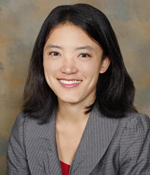
Yvonne Huang
Recent advances in the understanding of microbial communities and their roles in respiratory health and disease have brought new light to the lung microbiome. The symposium “The Lung Microbiome in 2014: State of the Art and Science,” from 2 to 4:30 p.m. today in 5 A-B (Upper Level) San Diego Convention Center, will look beyond the single pathogen-host paradigm.
Research on dynamic host-microbiota interactions in response to bacterial, viral, and fungal communities will be explored during the symposium, which is sponsored by the Assemblies on Allergy, Immunology, and Inflammation, and Microbiology, Tuberculosis, and Pulmonary Infections.
Speakers will discuss the impact of dynamic host-microbiota and microbe-microbe interactions on the maintenance of human health and progression of disease, and they’ll share innovative approaches to the study of microbial function and possible mechanisms of disease.
Over the last decade, a wealth of literature has been published about discoveries in the gut microbiome, says Yvonne Huang, MD, symposium co-chair.
“Many people, whether they’re involved in lung microbiome studies or not, are interested in how those approaches might be applied to our understanding of lung disease,” says Dr. Huang, associate director of the Adult Cystic Fibrosis Program and assistant professor of medicine at the University of California, San Francisco.
Dr. Huang’s co-moderators will be Jeffrey Curtis, MD, professor of internal medicine at the University of Michigan, Ann Arbor, and Alison Morris, MD, MS, associate professor of medicine and immunology at the University of Pittsburgh.
The program will open with James Kiley, PhD, director of the Division of Lung Diseases at the National Heart, Lung, and Blood Institute, Bethesda, MD, who will highlight current activities, important challenges, and future research opportunities when he presents “The Importance of Lung Microbiome Research in 2014.”
Dr. Huang will then present “The Role of the Lung Microbiome in Health and Disease,” and she will cover existing studies as a foundation for the next group of speakers.
David Underhill, PhD, professor of pathology and laboratory medicine at the University of California, Los Angeles, and associate director of the Division of Immunology Research in Biomedical Sciences at Cedars-Sinai Medical Center, will present “Host Responses to Fungal Commensals.”
“Dr. Underhill’s team recently published a prominent paper looking at interactions between fungal gut microbiota and the host, and their potential role in colitis,” Dr. Huang says. “He will breathe some perspective from the gut side of things, and that may inform us about approaches to adopt for studying the lung.”
Homer Twigg III, MD, associate professor of medicine and the Floyd and Reba Smith Investigator of Pulmonary Disease at Indiana University, Indianapolis, has studied host immune responses, such as alveolar macrophage responses to infection. He will present “Host Responses to Changes in the HIV Lung Microbiome.”
Dr. Huang’s colleague at UCSF, Susan Lynch, PhD, associate professor of medicine and director of the Colitis and Crohn’s Disease Microbiome Research Core, will tackle “The Gut-Airway Axis in Lung Disease.”
“She will address how the gut microbiome might influence systemic immune responses and subsequently airway inflammatory responses in the context of lung disease, and the relationship between the gut microbiome and allergic airway disease,” Dr. Huang says.
Douglas Conrad, MD, professor of medicine and director of the Adult Cystic Fibrosis Clinic at the University of California, San Diego, has collaborated with Forest Rohwer, PhD, at San Diego State University to study virus populations, specifically bacteriophages in cystic fibrosis sputum. He will discuss “Viral Infections in the Microbiome.”
The symposium will wrap up with Catherine Lozupone, PhD, assistant professor of biomedical informatics and personalized medicine at the University of Colorado, Denver, who will present “Analytic Approaches to Microbiome Data.” Dr. Lozupone’s work has pushed the development of novel approaches to looking at such data, determining the relevance of patterns seen on the microbial side, and relating this to the patient side, Dr. Huang says.
“While Dr. Kiley and I will introduce and summarize what is already known, the subsequent state-of-the-art talks will expand our thinking about how to tackle the issues being presented,” Dr. Huang says.
